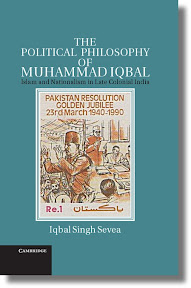Sevea: The Political Philosophy of Muhammad Iqbal
Sevea, Iqbal Singh:
The Political Philosophy of Muhammad Iqbal : Islam and Nationalism in Late Colonial India / Iqbal Singh Sevea. - Cambridge ; New York : Cambridge University Press, 2012. - xix, 234 S. : Kt.
ISBN 978-1-107-00886-1
£ 60,00
DDC: 320.557092; 954.035092
Beschreibung
This book reflects upon the political philosophy of Muhammad Iqbal, a towering intellectual figure in South Asian history, revered by many for his poetry and his thought. He lived in India in the twilight years of the British Empire and, apart from a short but significant period studying in the West, he remained in Punjab until his death in 1938. The book studies Iqbal's critique of nationalist ideology and his attempts to chart a path for the development of the 'nation' by liberating it from the centralizing and homogenizing tendencies of the modern state structure. Iqbal frequently clashed with his contemporaries over his view of nationalism as 'the greatest enemy of Islam'. He constructed his own particular interpretation of Islam – forged through an interaction with Muslim thinkers and Western intellectual traditions – that was ahead of its time, and since his death both modernists and Islamists have continued to champion his legacy. [Verlagsinformation]
Inhalt
Acknowledgements. ix
Glossary. xiii
Note on Translations and Transliteration. xix
Map of India, Circa 1937. xx
Introduction. 1
1. Muslim Political Discourse circa 1857–1940. 35
2. 'Mera Payam Aur Hai': Iqbal's Roles as an Intellectual and Poet. 62
3. Reconstruction of Islam. 94
4. Rejecting Nationalism, Relocating the Nation. 126
5. Development of the Nation. 164
Conclusion. 199
Select Bibliography. 211
Index. 227
Autor
Iqbal Singh Sevea, Assistant Professor, Department of History, University of North Carolina, Chapel Hill. Profile page.
Quellen: Cambridge University Press; WorldCat; Amazon (UK)
Bildquelle: Cambridge University Press
Bibliographie: [1]
References
- (2012). The Political Philosophy of Muhammad Iqbal: Islam and Nationalism in Late Colonial India . xix, 234 S.
Ähnlich
- Muslimischer Nationalismus, Fundamentalismus und Widerstand in Pakistan
- Nationhood and Identity Movements in Asia
- Extremismus im Namen der Religion
- Hindu Nationalism in India
- Fischer-Tiné: Shyamji Krishnavarma
- Agnani: Hating Empire Properly
- Olivelle: King, Governance, and Law in Ancient India
- Purohit: The Aga Khan Case
- Die politischen und wirtschaftlichen Beziehungen zwischen der Europäischen Union und Indien
- Religious Freedom in India

